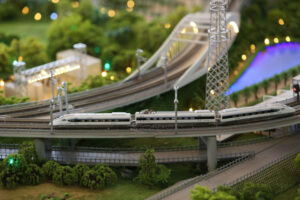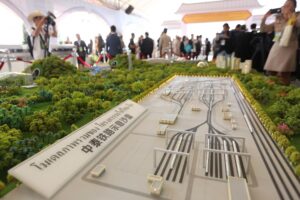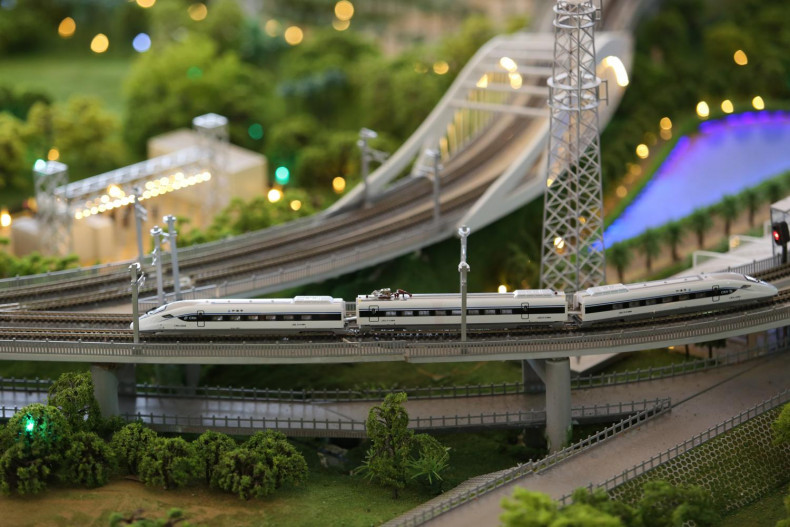
Bangkok-Nong Khai high-speed rail project, connecting to China’s high-speed railway network, will be operational by 2030
The government has confirmed the Bangkok-Nong Khai high-speed rail project, connecting to China’s high-speed railway network, will be operational by 2030.
According to government spokesman Jirayu Huangsab, on Tuesday the Transport Ministry reported to the cabinet on the progress of the cooperation project between the Thai government and Beijing to construct a high-speed railway.
Progress on the civil construction contracts for the Bangkok-Nong Khai high-speed rail system, including Phase 1 from Bangkok to Nakhon Ratchasima, stands at 35.8%.
Construction of two contracts — the Klang Dong-Pang Asok section and the Sikhiu-Kudjik section — has been completed, while 10 contracts are still under construction and two are in the procurement process.
In addition, the Rail Technology Research and Development Institute has been established.
As for Phase 2, the Nakhon Ratchasima-Nong Khai section is expected to be operational by 2030. This phase has completed its design and is under review by the National Environment Board for its environmental impact assessment (EIA) report.
The State Railway of Thailand’s board of directors already approved the project, and it will then be submitted to the cabinet for further consideration.
 Regarding the connection between Thailand’s high-speed railway and China’s via Laos, Mr Jirayu said it remains necessary to implement all five activities as planned to enable the transportation networks of both countries to link together.
Regarding the connection between Thailand’s high-speed railway and China’s via Laos, Mr Jirayu said it remains necessary to implement all five activities as planned to enable the transportation networks of both countries to link together.
These include: 1) the construction of the double-track railway network between Khon Kaen and Nong Khai, which is currently in the bidding stage, with service expected to begin in 2027; and 2) the renovation of the Friendship Bridge to accommodate cargo transport with an axle load capacity of 20 tonnes per axle.
The Department of Highways is studying the load-bearing capacity of the high-speed rail, and the construction of a new Thailand-Laos Mekong River Bridge, and has agreed to co-invest in the shared expenses within the territory of each side.
It is currently in the detailed design and EIA preparation phase. Additionally, the development of the freight transport zone and the cross-border travel connection between Thanaleng and Vientiane (Ban Khamsavath) has been completed and is now open for service.
Mr Jirayu said the government expects the high-speed rail project linking Bangkok, Nong Khai, Vientiane and China to present an opportunity for the Northeast region and for Thailand to connect with the global economy.
This should create opportunities for Thais to engage in trade and investment with regional markets, as well as with global markets that cater to more than 8 billion people, he said.
The government is implementing a strategic plan to develop infrastructure, laying the foundation for Thailand to become a regional transport and logistics hub, said Mr Jirayu.
This high-speed rail project marks Thailand’s first-ever high-speed railway, developed in collaboration between the Thai government and its Chinese counterpart.
The groundbreaking ceremony was held on Dec 21, 2017, and after more than six years, the overall construction progress is still less than half complete.
As of April 2024, only 32.9% of the project has been completed, lagging 33.5% behind schedule.
The high-speed rail project is divided into two phases. Phase 1 covers the Bangkok-Nakhon Ratchasima section, with a total distance of 251 kilometres and an investment budget of 179 billion baht, consisting of 14 civil work contracts.
Phase 2 covers the Nakhon Ratchasima-Nong Khai section, with an investment of 341 billion baht.
However, there have been several issues in implementing this project, including delays caused by contractors facing liquidity problems, as well as the controversy surrounding the construction of the Ayutthaya station, which has been opposed by conservationists who argue it could impact the Unesco World Heritage site of Ayutthaya.
Source: https://www.bangkokpost.com/business/general/2950550/high-speed-rail-project-to-commence-service-by-2030


